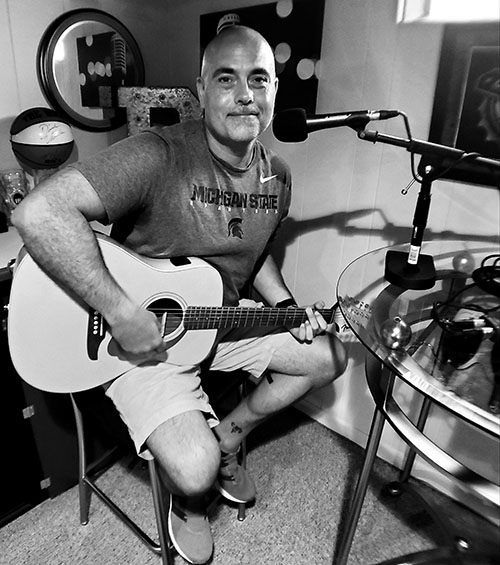Don’t Miss It – Register for Engaging New Peer-Led Summer Webinar Series
MEA member Brian Dalton learned how to survive a difficult endurance event while training to compete in four Ironman races in his 40s, and he discovered it wasn’t much different from strategies he used as an educator to successfully make it through a school year.
Just as in a brutal race involving a 2.4-mile swim, 112-mile bike ride, and 26.2-mile run, the classroom march from August through June tests an educator’s stamina, fortitude and perseverance – no more so than in these difficult times, he said.
“There are peaks and valleys, times you feel on top of the world and times where you just want to stop moving.”
 Now the veteran eighth-grade English teacher is sharing hard-fought wisdom, earned over a 25-year career in Rochester Community Schools, to help other educators not only survive tough challenges that play out in every classroom every year – but to thrive under those conditions.
Now the veteran eighth-grade English teacher is sharing hard-fought wisdom, earned over a 25-year career in Rochester Community Schools, to help other educators not only survive tough challenges that play out in every classroom every year – but to thrive under those conditions.
“This profession is hard,” he said. “I’m trying to be that life preserver for teachers, whether they’re young or old, because it doesn’t matter what age you are—anyone can fall apart. I’m trying to teach you how to better manage the waters of teaching, so to speak.”
Dalton is one of many presenters in the upcoming schedule of popular and highly informative peer-developed virtual training sessions offered by MEA’s Center for Leadership & Learning.
The Summer Essentials webinar series offers various 90-minute learning sessions free to members, all of which are SCECH- and certificate-eligible. Learn more and register now.
From how to help students learn to regulate emotions, to basics of Schoology, classroom management, and grant writing for fine arts educators, the summer series focuses on “planting seeds” for a successful next school year, said MEA UniServ Consultant Chad Williams.
A June 24 panel discussion targeting aspiring and early career educators – titled “What I Wish I Knew” – promises to be a goldmine of classroom-tested tips and strategies from practitioners who still remember what it’s like starting out. The panel will include several early career educator-leaders from MEA’s MiNE (Michigan New Educators) program.
“These sessions are offered by expert education colleagues from across the state and at convenient times – from 11 a.m. to 12:30 p.m. – which allow you to get in some essential learning before lunch and get on with the rest of your day,” Williams said.
For his part, Dalton promises his session – Teach4Endurance: The Warm Up Session” on June 22 – will be fun and active, so participants exit with ideas particular to their own lives and situations. The father of four – married to a teacher – will bring his guitar to sing, laugh, and expand on the lessons that he has learned will pay dividends over time.
For example:
- Know your purpose. “If you don’t have one, you’re shooting at a blank target.”
- Eat healthy. “If you don’t have nutrients, your body will say ‘I’m done,’ and that affects your mind. When you start feeling low, everything seems like it’s going down the tubes. And even though this sounds like the simplest thing, it’s one of the hardest things for people to take on and make change.”
- Don’t make it harder than it has to be. “I don’t care if they’re kindergartners or seniors in high school, and whether they admit it or not, the kids really just want someone that cares for them and loves them and wants the best for them.”
- Have an escape plan. “When all things fall apart, and the class really isn’t into that epic lesson on the Gettysburg address that you spent three days preparing – what will you do? If you push ahead and fight against it, and fight your students, you’re going to come home and feel terrible. Don’t do that, and don’t take it personally. Have a plan B, and even a C, just in case.”
- Keep an emotional bank account. “All the notes, emails, pleasantries, the nice stuff I get from kids or parents, I keep them. The reason I keep them is for when the scenario happens that someone is not happy and not nice to you. I look at all the positives, and my account is in the black.”
- Stay in the here and now. “The more you can live in the right now, the happier you’re going to be. Yesterday’s gone, and tomorrow is not guaranteed, so what exactly are you doing there? Better to stay present in the moment you’re in – whether it’s teaching a lesson or playing catch with your son or baking a cake.”
Dalton bases his presentation on a book he wrote and published with Silver Street Media, Teach4Endurance: Surviving the Swim, Bike, and Run in Today’s Classroom.
The book practically wrote itself in the hours spent training for his first Ironman competition, he said.
He was struck by the parallels between preparing for and completing a school year and a rigorous physical race of endurance. His book organizes 25 years of teaching wisdom around those common themes and includes three “workouts” or workbook tasks of varying intensity in each chapter.
“I still go through those chapter workouts when I’m facing my own challenges,” he said. “I take my own advice when I need to be reminded of it.”
After completing dozens of triathlons across Michigan, Dalton set his mind to finishing his first Ironman race – the Escape from Alcatraz – which began with a swim in the icy waters and strong currents of San Francisco Bay in 2013.
He wanted to show his children and students that it’s truly possible to achieve your dreams if you prepare well and stick with it, he said. Again—the same is true of teaching, he said. “Sometimes in your darkest hour, you strike gold. You might have to fight like hell, but it’s waiting for you.”



